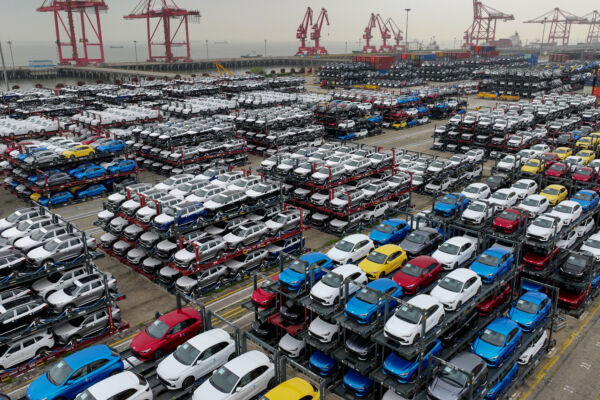The European Union has decided to impose a maximum tariff of 45.3% on electric cars made in China, indicating that negotiations between the EU and Beijing have failed to make substantial progress. Experts believe that this move reflects the escalating geopolitical and ideological tensions between Europe and China.
After more than a year of conducting anti-subsidy investigations, the European Commission has decided to impose additional tariffs ranging from 7.8% to 35.3% on top of the standard 10% import tariff on conventional cars, depending on the manufacturer.
These additional tariffs were officially approved on Tuesday (October 29) and published in the official EU gazette, indicating that they will come into effect from zero hour on Wednesday (30th) or at the latest, by zero hour on Thursday.
The European Commission responsible for overseeing EU trade policy stated that the tariffs are necessary to counter unfair subsidies provided by the Chinese government, including preferential financing, grants, and below-market pricing for land, batteries, and raw materials.
China has an annual surplus production capacity of 3 million electric cars that it needs to export, which is double the size of the EU market. With the United States and Canada already imposing 100% tariffs, Europe is seen as the most viable destination for these electric cars.
The Chinese government has denounced the EU’s tariffs as protectionist, claiming they harm EU-China relations and disrupt the automotive supply chain. In retaliation, China has initiated investigations into EU imports of brandy, dairy products, and pork this year.
European car manufacturers have expressed concerns about the threat posed by low-cost Chinese electric cars. The EU estimates that Chinese electric car brands’ market share in the EU has risen rapidly from less than 1% in 2019 to 8% currently, with a potential to reach 15% by 2025.
Over the past five years, the EU’s stance towards China has become increasingly assertive. While the EU acknowledges China as a potential partner in some areas, it also views China as a competitor and systemic adversary.
According to Davy Jun Huang, a Chinese-American economist, the EU’s actions against Chinese electric cars are not just about addressing low-cost competition but also carry underlying political motivations.
Huang believes that the EU is sending a message that it cannot simultaneously profit from the EU market while undermining European interests. He emphasizes that this is not merely an economic issue but a deeper geopolitical and ideological struggle.
Based on data from the European Commission, China provided $66 billion in financial support to the electric car industry in 2022. Huang highlights that these subsidies, accounting for nearly one-third of car prices, unfairly favor electric cars over traditional vehicles, distorting market competition.
Huang argues that China’s heavy investment in the electric car industry comes at the expense of domestic welfare and subsidies, harming both Chinese and foreign populations and going against the universal values of freedom and equality that the EU upholds.
In addressing the dumping of low-cost Chinese electric cars, Huang suggests that the EU should not solely rely on tariffs but also enforce strict quality and safety regulations on Chinese car manufacturers.
He points out that incidents of Chinese domestic electric cars catching fire and causing fatalities have become a widespread issue. European and American research organizations have found that Chinese cars perform poorly in crash tests. Strengthening safety checks can effectively counter the influx of low-cost Chinese electric cars.
Huang predicts that the EU’s anti-subsidy tariffs may trigger a chain reaction, leading more countries to adopt punitive tariffs against export products heavily subsidized by China.
In response to the EU’s tariff decision, Xu Zhen, a senior financial expert from China, believes that while some countries are taking a more proactive stance against “Made in China,” it is unlikely to completely block Chinese electric cars from entering the EU.
Xu points out that companies like BYD have already established factories in EU and North American countries, allowing them to bypass tariff barriers. Additionally, even with the imposed tariffs, Chinese car companies such as BYD can still maintain around 25% profit margins due to their cost advantages.
Xu warns that the EU should not underestimate the nature of the Chinese Communist Party and must not appease or appease it.
In Xu’s view, the Chinese Communist Party views the electric car industry as a weapon in its “unrestricted warfare” against Europe, aiming to undermine the electric car industries of Europe and the United States, similar to how it targeted the European solar industry.
He argues that China is attempting to “colonize Europe industrially” and sow discord between Europe and the United States, ultimately aiming to prolong the precarious Chinese regime’s survival.

